|
Upcoming Events
MacArthur Asia Security Initiative Dissemination Meeting
28–29 November 2011
RSIS Centre for Non-Traditional Security (NTS) Studies and
RSIS Centre for Multilateralism Studies
Singapore
The RSIS Centre for NTS Studies, and the RSIS Centre for Multilateralism Studies, will be co-organising the MacArthur Asia Security Initiative Dissemination Meeting on 28–29 November 2011 at the Marina Mandarin Hotel in Singapore.
 This Dissemination Meeting aims to showcase the research outcomes of the MacArthur Foundation’s Asia Security Initiative projects and to share the findings to a wider policy community and civil society. Over the course of 3 years (2009–11), both centres have, under the MacArthur Asia Security Initiative, conducted research on non-traditional security (internal and cross-border conflict; climate change, environmental security and natural disasters; as well as energy and human security) and regional security cooperation. This Dissemination Meeting aims to showcase the research outcomes of the MacArthur Foundation’s Asia Security Initiative projects and to share the findings to a wider policy community and civil society. Over the course of 3 years (2009–11), both centres have, under the MacArthur Asia Security Initiative, conducted research on non-traditional security (internal and cross-border conflict; climate change, environmental security and natural disasters; as well as energy and human security) and regional security cooperation.
Participants of this meeting will include prominent policymakers, Track II parties, academics, researchers and civil society representatives.
Click here for a tentative meeting programme.
This meeting is for invited participants only.
^ To the top
Announcements
BIPSS Joins EU-Asia Network
 The Bangladesh Institute of Peace and Security Studies (BIPSS) is now a member of the EU-Asia Network. The EU-Asia Network aims to be a pioneer network linking leading think tanks in Asia and Europe to generate discussions on how EU-Asia relations should look like in the 21st century. Emphasising the necessity of an EU-Asia bridge, this network will also seek to evaluate EU’s approach to Asia. The research pillars of the EU-Asia Network include global governance and regional setting, the security-development nexus, trade, energy and climate change, as well as democracy and human rights. The Bangladesh Institute of Peace and Security Studies (BIPSS) is now a member of the EU-Asia Network. The EU-Asia Network aims to be a pioneer network linking leading think tanks in Asia and Europe to generate discussions on how EU-Asia relations should look like in the 21st century. Emphasising the necessity of an EU-Asia bridge, this network will also seek to evaluate EU’s approach to Asia. The research pillars of the EU-Asia Network include global governance and regional setting, the security-development nexus, trade, energy and climate change, as well as democracy and human rights.
CSDS-Lokniti Receives Research Grant from Indian Council of Social Science Research
 The proposed study by the Centre for Developing Societies’ (CSDS’)-Lokniti Programme for Comparative Democracy has received a research grant from the Indian Council of Social Science Research (ICSSR) as part of its call for proposals under the two themes of ‘National integration: Old and New Bearings’ and ‘Democracy: New Publics’. The proposed study by the Centre for Developing Societies’ (CSDS’)-Lokniti Programme for Comparative Democracy has received a research grant from the Indian Council of Social Science Research (ICSSR) as part of its call for proposals under the two themes of ‘National integration: Old and New Bearings’ and ‘Democracy: New Publics’.
The project contains a series of activities distinct to each theme but which still links the themes together. The project will seek to investigate the relationship between state-formation, nation-building and constitution of public(s) under conditions of democratic contestation.
Click here to find out more about this project.
CISS Announces New Academic Appointments
 The Centre for International Security Studies (CISS) in the University of Sydney, is pleased to announce the appointment of three new academics due to begin in the next 6 months. The Centre for International Security Studies (CISS) in the University of Sydney, is pleased to announce the appointment of three new academics due to begin in the next 6 months.
Dr Adam Kamradt-Scott comes to the Centre from the London School of Hygiene and Tropical Medicine where he has been based since 2009. Dr Kamradt-Scott has a background in nursing prior to his academic career in international security and has worked with senior policymakers in Australia on pandemic preparedness plans. He will be joining the Centre as a Senior Lecturer from November 2011.
Dr Frank Smith is currently a Research Fellow at Griffith University and an Associate Investigator with the Australian Research Council Centre of Excellence in Policing and Security. He specialises in technology and international security with a focus on biosecurity and US defence policy. Dr Smith will be joining the Centre as a lecturer from January 2012.
Dr John Lee joins the Centre as an Adjunct Associate Professor and the Michael Hintze Fellow for Energy Security. Dr Lee holds a PhD in international relations from Oxford University and is one of Australia’s rising academic talents with a high media profile and a demonstrated capacity to work across disciplinary and geographical spaces. He joined the Centre in August.
Click here to find out more about CISS activities.
CSDS Conducts State of the Nation Survey 2011
 Lokniti-CSDS in collaboration with CNN IBN and CNBC–TV 18 conducted the State of the Nation Survey August 2011 study across 19 states in India.
Lokniti-CSDS in collaboration with CNN IBN and CNBC–TV 18 conducted the State of the Nation Survey August 2011 study across 19 states in India.
Fieldwork for the study was conducted between 25 and 31 July 2011. 39,000 randomly selected names from the updated electoral rolls were approached for interview, of which 20,268 interviews were successfully completed. Women, Dalits, Adivasis, Muslims and rural persons comprised 46 per cent, 21 per cent, 7 per cent, 10 per cent and 73 per cent of the sample respectively. The composition reflected the representativeness of the sample despite a slight over-representation of dalits and a slight under-representation of Muslims. Results of the study were published in the media.
Click here to read the findings as presented in The Hindu. |
^ To the top
Recent Events
BIPSS Participates in Major Climate Change Conference in The Hague
21 September 2011
Bangladesh Institute of Peace and Security Studies (BIPSS)
The Hague, The Netherlands
 BIPSS President, Major General Muniruzzaman (Retd), spoke at the Conference on ‘Climate Change, Conflict and Migration’ held in The Hague, Netherlands, on 21 September 2011. The Conference was organised by the Alliance for UN University of Peace (UPEACE), Costa Rica and the Institute for Social Studies (ISS), The Hague, and supported by the Netherlands’ Ministry of Foreign Affairs. BIPSS President, Major General Muniruzzaman (Retd), spoke at the Conference on ‘Climate Change, Conflict and Migration’ held in The Hague, Netherlands, on 21 September 2011. The Conference was organised by the Alliance for UN University of Peace (UPEACE), Costa Rica and the Institute for Social Studies (ISS), The Hague, and supported by the Netherlands’ Ministry of Foreign Affairs.
The conference had a special focus on the water dimension of climate security. In his presentation, General Munir focused on climate change, migration, water security and conflicts from a human security perspective. General Munir also spoke at a special lecture organised at the Clingendael Institute for International Relations in The Hague.
Click here for more information on BIPSS activities and publications.
BIPSS President Visits Norway for South Asian Water Security Project
September 2011
Bangladesh Institute of Peace and Security Studies (BIPSS)
Oslo and Bergen, Norway
 BIPSS President, Major General Muniruzzaman (Retd), was in Oslo, Norway, at the invitation of the Norwegian Government for the government-sponsored project on South Asian water security. As a Distinguished Visiting Fellow, General Munir shared his thoughts and insights on the subject during his fellowship. General Munir also visited Bergen, Norway, and spoke at the ‘World Conference on Climate Change’, highlighting major threats and security implications of climate change for international peace and stability. BIPSS recently launched a project on water scarcity in Bangladesh and South Asia in association with the Peace Research Institute Oslo (PRIO). BIPSS President, Major General Muniruzzaman (Retd), was in Oslo, Norway, at the invitation of the Norwegian Government for the government-sponsored project on South Asian water security. As a Distinguished Visiting Fellow, General Munir shared his thoughts and insights on the subject during his fellowship. General Munir also visited Bergen, Norway, and spoke at the ‘World Conference on Climate Change’, highlighting major threats and security implications of climate change for international peace and stability. BIPSS recently launched a project on water scarcity in Bangladesh and South Asia in association with the Peace Research Institute Oslo (PRIO).
BIPSS President Visits US Air Force University
September 2011
Bangladesh Institute of Peace and Security Studies (BIPSS)
Alabama, US
 BIPSS President, Major General Muniruzzaman (Retd), spoke at the US Air Force University, Maxwell Air Force Base, Alabama on the occasion of the ‘US Air Force Minerva Energy and Environmental Security Symposium’ in September 2011. The Symposium is the culmination of research and study sponsored by the US Secretary of Defense through the Minerva Initiative. In his presentation, General Munir focused on the complex security risks emerging from international energy and environmental security connections. BIPSS President, Major General Muniruzzaman (Retd), spoke at the US Air Force University, Maxwell Air Force Base, Alabama on the occasion of the ‘US Air Force Minerva Energy and Environmental Security Symposium’ in September 2011. The Symposium is the culmination of research and study sponsored by the US Secretary of Defense through the Minerva Initiative. In his presentation, General Munir focused on the complex security risks emerging from international energy and environmental security connections.
CSDS Organises Discussion Session on Electoral Reform and Civic Advocacy
24 August 2011
Centre for the Study of Developing Societies (CSDS)
New Delhi, India
 A discussion session was organised by the CSDS-Lokniti team in New Delhi for a group of officials from the Democracy International and Afghanistan Electoral Reform Organization (AERO) on 24 August 2011 at the CSDS Seminar Hall. The discussion session was part of Democracy International’s initiative called ‘Afghanistan Electoral Reform and Civic Advocacy’ (AERCA). AERCA’s purpose is to help facilitate an Afghan-led electoral reform initiative in order to strengthen Afghan democracy and foster innovations in governance through an electoral reform organisation and through innovative research projects. A discussion session was organised by the CSDS-Lokniti team in New Delhi for a group of officials from the Democracy International and Afghanistan Electoral Reform Organization (AERO) on 24 August 2011 at the CSDS Seminar Hall. The discussion session was part of Democracy International’s initiative called ‘Afghanistan Electoral Reform and Civic Advocacy’ (AERCA). AERCA’s purpose is to help facilitate an Afghan-led electoral reform initiative in order to strengthen Afghan democracy and foster innovations in governance through an electoral reform organisation and through innovative research projects.
China and Its Neighbours
15 August 2011
RSIS Centre for Non-Traditional Security (NTS) Studies
Singapore
 Given China’s expanding national power and its rising profile in international affairs, its foreign-policy intentions have attracted wide attention from policy and academic communities across the world, and in particular, from the Asia-Pacific countries (which are often directly affected by China’s policies). Over the past year, China’s handling of regional hotspot issues such as the Cheonan incident has led to more questions – than answers – regarding its relations with its neighbours. Given China’s expanding national power and its rising profile in international affairs, its foreign-policy intentions have attracted wide attention from policy and academic communities across the world, and in particular, from the Asia-Pacific countries (which are often directly affected by China’s policies). Over the past year, China’s handling of regional hotspot issues such as the Cheonan incident has led to more questions – than answers – regarding its relations with its neighbours.
In this seminar, Prof. Zha Daojiong sought to share with the audience his personal observations of, and explanations for, China’s reactions to those headline events, with a focus on the Asia-Pacific region. Themes covered in the seminar included the government of China’s national security considerations, the puzzles arising from its policy behaviours and the answers, and the likely role that the academic community can play in relation to China’s engagement with its immediate neighbours.
Click here to learn more and to listen to the seminar.
International Conference on Asian Food Security (ICAFS) 2011
10–12 August 2011
RSIS Centre for Non-Traditional Security (NTS) Studies and
South East Asian Regional Center for Graduate Study and Research in Agriculture (SEARCA)
Singapore
 |
| Prof. Paul Teng, Lead Convenor for ICAFS, delivering his speech during the opening ceremony. |
ICAFS took place from 10–12 August 2011 at the Grand Copthorne Waterfront Hotel in Singapore. ICAFS, which followed the theme of ‘Feeding Asia in the 21st Century: Building Urban-Rural Alliances’, was convened in the context of complex and multifaceted challenges throughout food systems in Asia. The Conference sought to address timely questions relating to these challenges and foster discussions among a range of stakeholders from Asia’s food sectors.
Many food security questions centre upon the need to sustainably and equitably feed and nourish a larger, more urban, and increasingly affluent Asian population in the face of spiralling food prices, changing agricultural practices, natural resource and environmental concerns (such as water and arable land), and the growing number of undernourished in the region. In order to formulate a multifaceted and integrated global strategy to tackle these challenges, ICAFS brought together an array of experts from across public, private, civil society and academic spheres.
Participants examined a range of issues at the urban-rural interface in the key dimensions of food security: food availability, physical access, economic access and utilisation. These dimensions, along with a high level forum, a session framing the scope of Asian food challenges and a capstone session, constituted the organisational structure of the ICAFS proceedings. The Conference culminated in an ‘ICAFS Statement on Feeding Asia in the 21st Century’.
Click here to access speakers’ presentations and the programme.
CSDS Delivers Presentations in August
August 2011
Centre for the Study of Developing Societies (CSDS)
India and China
 Dr A.K. Verma, Chair of the Department of Political Science in Christchurch College, delivered a lecture on ‘Lokpal Bills and the Civil Society Initiative’ at the Singhania Institute of Management, Kanpur, on 9 August 2011. The event was organised by a non-governmental organisation, Parivartan. Dr A.K. Verma, Chair of the Department of Political Science in Christchurch College, delivered a lecture on ‘Lokpal Bills and the Civil Society Initiative’ at the Singhania Institute of Management, Kanpur, on 9 August 2011. The event was organised by a non-governmental organisation, Parivartan.
Prof. Annapurna Nautiyal, Head of the Department of Political Science in Garhwal University, delivered two lectures for senior command officers of Sashastra Seema Bal (SSB) at the SSB Academy Srinagar on 4–5 August 2011 on the following topics: (1) Good Governance: Concept and Problems; and (2) The Kashmir Problem. She also visited the Institute of South Asian Studies at Sichuan University, Chengdu, China, on 20–26 August 2011 and delivered lectures on the following topics: (1) Women of Garhwal Himalayas: Role and Conditions; (2) Indo-China Relations: An Indian Perspective; and (3) Security Scenario in South Asia. Prof. Nautiyal also participated in the Meeting of the ‘All India Women's Studies Directors’ sponsored by the University Grants Commission and organised by the University of Hyderabad on 28–29 August 2011.
Deputy Director of CSDS-Lokniti Programme, Dr Sanjay Kumar, delivered a lecture on ‘Electoral Participation of Women: Assembly Election 2011’, at a Workshop on ‘Women in the Political Space’, jointly organised by the Asian College of Journalism, Friedrich Ebert Stiftung and Women's Feature Service, Asian College of Journalism, in Chennai on 27 August 2011.
Mr Lallian Chhunga, Asst Prof. in the Department of Political Science, Mizoram University, participated as a subject expert in a live discussion on ‘Communal Harmony in India’ at Doordarshan (an Indian public service broadcaster). The discussion was aired between 4–4.30pm on 26 August 2011.
Seminar to Launch Reports on Conflict Resolution in Asia
27 July 2011
RSIS Centre for Non-Traditional Security (NTS) Studies
Singapore
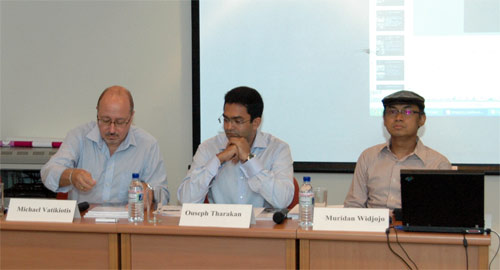 |
| From left to right: Dr Michael Vatikiotis, Mr Ouseph Tharakan and Dr Muridan Widjojo |
This seminar, organised by the RSIS Centre for NTS Studies, marked the launch of three country reports from the Comparative Perspectives on Conflict Management and Peacemaking in Asia project undertaken by the Centre for Humanitarian Dialogue (HD Centre) and its partners. The HD Centre’s primary role across the globe is to facilitate dialogue and mediate in armed conflicts. Its collaborators in this project, which began in 2009, included the Indonesian Institute of Sciences, Current Asia, the Institute of Bangsamoro Studies and the Delhi Policy Group.
The three country reports aim to offer a comparative perspective on approaches to conflict resolution, with each focusing on specific cases: (1) India – Kashmir, Manipur and the Naxalite insurgency; (2) Indonesia – Papua, Maluku and Sulawesi; and (3) Philippines: the emphasis is on the use of civilian militia, a thematic issue of pressing concern in many peace processes, including in its southern provinces.
The seminar was led by Dr Michael Vatikiotis, Regional Director of the HD Centre. The authors of two country reports, Mr Ouseph Tharakan and Dr Muridan Widjojo, also presented their research findings at the event.
Click here to learn more and to listen to the seminar.
RCSS Participates in Water Security and Energy Security Meetings in Turkey
13–15 July 2011
Regional Centre for Strategic Studies (RCSS)
Ankara, Turkey
 Mr Chaminda Hettiarachchi, RCSS Associate Director, and Ms Suranthi Boange, RCSS Programme Officer, attended working group meetings on the theme of ‘Water Security and Energy Security’ on 13–15 July 2011 in Ankara, Turkey. These meetings were organised by the Regional Network of Strategic Studies Centers (RNSSC), Near East South Asia Center (NESA Center) for Strategic Studies of National Defense University (NDU) in Washington DC, and the Foundation for Political, Economic and Social Research (SETA) in Turkey. Mr Chaminda Hettiarachchi, RCSS Associate Director, and Ms Suranthi Boange, RCSS Programme Officer, attended working group meetings on the theme of ‘Water Security and Energy Security’ on 13–15 July 2011 in Ankara, Turkey. These meetings were organised by the Regional Network of Strategic Studies Centers (RNSSC), Near East South Asia Center (NESA Center) for Strategic Studies of National Defense University (NDU) in Washington DC, and the Foundation for Political, Economic and Social Research (SETA) in Turkey.
Mr Hettiarachchi presented a paper on ‘Water Security in Sri Lanka’ at the water security working group meeting. The paper highlighted the history of water management in Sri Lanka, the main dimensions of water security in the Sri Lankan context, the country’s achievements and the challenges faced in water security. The working group discussed issues of water security in the Middle East and South Asia particularly with respect to environmental changes and political dynamics in the region.
Ms Suranthi Boange delivered a presentation on energy and environment security in Sri Lanka at the energy security working group. The group explored current problems and challenges faced in securing long-term energy demands for the Middle East and South Asia regions, as well as the viability and safety of nuclear power to meet regional energy demands. It also further examined the different country perspectives on adopting nuclear power as a safe energy source.
The two working groups are expected to submit policy papers on identified research topics at a plenary session meeting, scheduled to be held in Istanbul, Turkey in November 2011.
CSDS Participates in Sayyid Muhammed Ali Shihab Thangal
Commemorative International Seminar
9 July 2011
Centre for the Study of Developing Societies (CSDS)
Kozhikode, India
Dr K.M. Sajad Ibrahim, Lecturer in the Department of Political Science in the University of Kerala, presented a paper on ‘Political Empowerment of Indian Muslims: Challenges in the Twenty First Century’ at the Sayyid Muhammed Ali Shihab Thangal Commemorative International Seminar on 9 July 2011 at Kozhikode. The event was organised by the Kerala Muslim Data Bank.
CSDS Participates in Election Observation of the Thai General Election
3 July 2011
Centre for the Study of Developing Societies (CSDS)
Bangkok, Thailand
 CSDS-Lokniti was part of the International Election Observation Mission of the Asian Network for Free Elections (ANFREL) in Thailand for the Country’s 26th General Election to the Parliament held on 3 July 2011. Ms Banasmita Bora represented Lokniti as a Short Term Observer from 22 June to 5 July 2011. CSDS-Lokniti is a member of ANFREL – a regional network of civil society organisations that strives to promote and support democratisation at national and regional levels in Asia. CSDS-Lokniti was part of the International Election Observation Mission of the Asian Network for Free Elections (ANFREL) in Thailand for the Country’s 26th General Election to the Parliament held on 3 July 2011. Ms Banasmita Bora represented Lokniti as a Short Term Observer from 22 June to 5 July 2011. CSDS-Lokniti is a member of ANFREL – a regional network of civil society organisations that strives to promote and support democratisation at national and regional levels in Asia.
Click here to read ANFREL’s preliminary report on the election.
^ To the top
Recent Publications
Libya and the Responsibility to Protect: The Exception and the Norm
 Asia Pacific Centre for the Responsibility to Protect (APCR2P) Asia Pacific Centre for the Responsibility to Protect (APCR2P)
Alex J. Bellamy, Ethics & International Affairs, Vol. 25.3, 20 September 2011.
The Responsibility to Protect (RtoP) played an important role in shaping the world’s response to actual and threatened atrocities in Libya. Not least was the adoption of Resolution 1973 by the UN Security Council on 17 May 2011 which reflected a change in the Council's attitude toward the use of force for human protection purposes; and the role played by the UN’s new Joint Office on the Prevention of Genocide and the Responsibility to Protect which points toward the potential for this new capacity to identify threats of mass atrocities and to focus the UN's attention on preventing them. These two facts suggest that significant progress on the RtoP has been made. Where it was once a term of art employed by a handful of like-minded countries, activists, and scholars, but regarded with suspicion by much of the rest of the world, RtoP has now become a commonly accepted frame of reference for preventing and responding to mass atrocities. |
|
Libya and the State of Intervention
 Asia Pacific Centre for the Responsibility to Protect (APCR2P) Asia Pacific Centre for the Responsibility to Protect (APCR2P)
Tim Dunne, R2P Ideas in Brief, Vol. 1, No. 1, 2011.
This is a briefing written by Tim Dunne, Research Director at the APCR2P, which focuses on difficult issues related to Libya and state intervention, including the hard question about the RtoP and regime change. It also gives background information on past humanitarian actions, and the context of Australia's activism on RtoP. |
|
Farmers’ Suicides and Statehood Demand in Bundelkhand
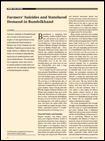 Centre for the Study of Developing Societies (CSDS)
Centre for the Study of Developing Societies (CSDS)
A.K. Verma, Economic And Political Weekly, Vol. 46, No. 28, pp. 10–11, 9–15 July 2011.
Farmers’ suicides in Bundelkhand, India, are a result of several years of neglect of the agricultural sector and industrial backwardness. Neither the Uttar Pradesh nor the Madhya Pradesh government has made efforts to address the basic issues of ecological degradation, agricultural modernisation and rural indebtedness. The demand for a separate state only serves to satisfy political ends and is no solution for the multiple problems of Bundelkhand’s farmers. |
|
Human Trafficking: A Security Concern for Bangladesh
 Bangladesh Institute of Peace and Security Studies (BIPSS)
Bangladesh Institute of Peace and Security Studies (BIPSS)
Issue Brief, No. 9, August 2011.
This Issue Brief explores the problem of human trafficking, a growing security threat for Bangladesh. It highlights the challenges and implications of human trafficking from both human and national security dimensions. The Brief focuses specifically on the issue of trafficking in persons. In Bangladesh, human trafficking has become an acute problem. Doubt has been cast on the government’s willingness to address the issue given the complicity of the government with the trafficking nexus. The US Department of State has placed Bangladesh in Tier 2 of its trafficking watchlist, which poses a threat of sanctions being placed on Bangladesh if the country fails to improve efforts to counter the threat of the trafficking in persons by next year. |
|
Report on the International Workshop on ‘Security Implications of Climate Change in the Asia-Pacific’
 Ilmin International Relations Institute (IRRI)
Ilmin International Relations Institute (IRRI)
Workshop Report, July 2011.
This report summarises the proceedings of the Ilmin International Relations Institute-Global Green Growth (IIRI-GGGI) Workshop on ‘Security Implications of Climate Change in the Asia-Pacific’ held on 8 April 2011 in Korea University in Seoul. The workshop was supported by the Ford Foundation through the Consortium of Non-Traditional Security Studies in Asia (NTS-Asia).
The workshop aimed to address climate security and explore national and regional policy responses. Topics that were discussed included the security aspects of climate change, current responses to climate change in the region, and the increasing accountability of regional organisations to address climate change in the Asia-Pacific. |
|
Women, Peace and Security: Moving from Rhetoric to Action
 Institute for Human Security (IHS), La Trobe University
Institute for Human Security (IHS), La Trobe University
Jasmine-Kim Westendorf, IHS Working Paper Series, No. 4, 2011.
With the changing nature of warfare over the past half century, and the increasing awareness of the specific impact of warfare on women, the international legal framework has been expanded to address the particular challenges faced by women in conflict and post-conflict contexts. This process culminated in 2000 with the adoption of UN Security Council Resolution (UNSCR) 1325 on women, peace and security, which was the first UN document to explicitly address the role and needs of women in peace processes. Ten years on, this paper assesses the current state of UNSCR 1325 implementation globally, and explores the opportunities and challenges involved in using National Action Plans (NAPs) to systematise the resolution’s implementation at national levels. |
|
International Pandemic Preparedness and Response Conference
 RSIS Centre for Non-Traditional Security (NTS) Studies
RSIS Centre for Non-Traditional Security (NTS) Studies
Conference Report, August 2011.
This report covers the proceedings of the International Pandemic Preparedness and Response Conference 2011 themed ‘Finding the Balance between Vigilance, Warning and Lessons from Disaster Management’ convened by the RSIS Centre for NTS Studies in Singapore on 18–19 April 2011.
The Conference brought together a wide array of participants from across Asia and beyond to share information and exchange ideas on the lessons to take away from the handling and management of past pandemics in the region. It also aimed to discuss and determine the best ways forward to prepare for future pandemics or outbreaks without compromising other health security and disease priorities. |
|
Symposium on Inter-State Water Conflicts in Southern Asia
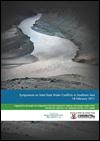 RSIS Centre for Non-Traditional Security (NTS) Studies
RSIS Centre for Non-Traditional Security (NTS) Studies
Conference Report, June 2011.
Water conflicts are a subject of intense debate and discussion in Southern Asia with factors such as the history of partition, a burgeoning population, increasing urbanisation and scarcity of water resources, serving only to magnify transboundary river disputes in the region.
This report summarises the proceedings of a ‘Symposium on Inter-State Water Conflicts in Southern Asia’, organised by the South Asia Programme of the RSIS Institute for Defence and Strategic Studies (IDSS), and the RSIS Centre for NTS Studies, on 18 February 2011. The Symposium brought together participants from diverse fields to present points of view from both sides of India's water conflicts with Pakistan, Bangladesh and China, and to discuss those perspectives. The aim was to understand and identify areas of agreement and disagreement, devise ways to reduce differences, and explore new, practical steps to reduce friction among states. |
|
NTS-MacArthur Digest
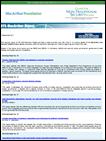 RSIS Centre for Non-Traditional Security (NTS) Studies
RSIS Centre for Non-Traditional Security (NTS) Studies
September 2011.
This second issue of the NTS-MacArthur Digest provides a broad summary and web links to 12 working papers of the MacArthur Asia Security Initiative Policy Series published under the MacArthur Asia Security Initiative beginning from March this year.
Papers in this issue cover topics such as REDD and REDD+ in Indonesia, ASEAN and security sector governance, gender and climate change, and energy security cooperation. |
|
Forests, Food and Fuel: REDD+ and Indonesia’s Land-use Conundrum
 RSIS Centre for Non-Traditional Security (NTS) Studies
RSIS Centre for Non-Traditional Security (NTS) Studies
J. Jackson Ewing, MacArthur Asia Security Initiative Policy Working Paper, No. 19, August 2011.
Indonesia faces pronounced land-use challenges. The country must deal with the legacies of short-sighted land conversions, the need to pursue foreign investment, capital growth and employment generation through profitable land intensive industries, and the rising food demands of a growing and increasingly urban population. Moreover, Indonesia must pursue these daunting objectives without overly compromising its endowment of forest resources; which provide a range of valuable services both domestically and internationally.
This paper takes as its point of entry the movement of the Reduced Emissions through Deforestation and Forest Degradation (REDD) programme into Indonesia’s land-use calculus. |
|
Cooperating in the Energy Security Regime Complex
 RSIS Centre for Non-Traditional Security (NTS) Studies
RSIS Centre for Non-Traditional Security (NTS) Studies
Jochen Prantl, MacArthur Asia Security Initiative Policy Working Paper, No. 18, August 2011.
Existing work on energy security tends to overemphasise the prospect of competition and conflict over resources while under-exploring the promise of cooperation among global and regional economies. Viewing energy security through the spectre of armed conflict traps policy planners in a zero-sum analysis and strongly suggests that the energy security of one country can only be achieved at the expense of another. Yet such a conclusion is fundamentally flawed, since it ignores the increasingly complex interdependence in the energy and product trade chain among countries, globally and regionally.
This paper provides an analytical framework for understanding and explaining energy security and highlights some building blocks for crafting energy cooperation in East Asia. There is no integrated regime to address issues related to energy security. Instead, there is a patchwork of loosely coupled rules, regulations and institutions, overlapping and sometimes competing, which amount to a regime complex. |
|
(Not) Reconciling International Security (IS) with Non-traditional Security (NTS) Studies: Westphalia, the 'West' and the Long Shadow of 1944
 RSIS Centre for Non-Traditional Security (NTS) Studies
RSIS Centre for Non-Traditional Security (NTS) Studies
Shaun Breslin, MacArthur Asia Security Initiative Policy Working Paper, No. 17, August 2011.
The end of the Cold War has seen a shift away from states towards more people-centred understandings of security, leading to some previously neglected issues becoming part of the international security agenda. However, the move to address NTS challenges tends to be limited to the causes of insecurity for people in the developed world. The causes of fear and want of millions in the developing world are left outside the discourses of international security (IS), and consequently, these concerns are often marginalised when it comes to attempts to find new ways of ensuring international security.
This paper argues that the differences between NTS and IS studies may be too fundamental for them to ever find a comfortable common ground; and it suggests that the sub-disciplines of regional/area studies and international political economy (IPE) may offer greater utility in moving forward the NTS discourse. |
|
Climate Insecurities in Indonesia: Implications and Challenges for Defence Transformation
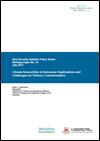 RSIS Centre for Non-Traditional Security (NTS) Studies
RSIS Centre for Non-Traditional Security (NTS) Studies
Evan A. Laksmana, MacArthur Asia Security Initiative Policy Working Paper, No. 16, July 2011.
This paper seeks to identify and assess key climate insecurities in Indonesia and further explore how they could potentially influence the process of defence reform that has been ongoing in Indonesia since Suharto's downfall in 1998. Key climate insecurities in Indonesia are related to energy and food security, large-scale disasters, drought, changing climate patterns and rising sea levels. Furthermore, this paper argues that given these security implications, the Indonesian National Defence Forces (TNI) has yet to seriously assess and incorporate climate change into its force development plans. Finally, this paper outlines some of the key challenges and prospects for TNI’s defence reform process, as it relates to climate change. |
|
Differentiated Policies: Indonesia's International Leadership and Internal Challenges
 RSIS Centre for Non-Traditional Security (NTS) Studies RSIS Centre for Non-Traditional Security (NTS) Studies
Alistair D.B. Cook, NTS Policy Brief, No. 12, June 2011.
Indonesia’s position as a regional champion of democracy and human rights has become prominent in international forums since the resignation of President Suharto in 1998 and the subsequent period of internal democratic reform. Its proactive foreign policy culminated in the establishment of the Bali Democracy Forum in 2008 to promote and strengthen democracy and the rule of law in Asia through a process of learning and sharing. While Indonesia's proactive foreign policy continues, significant internal challenges remain. This policy brief offers an insight into one of Indonesia’s longest running internal challenges, Papua, and suggests the use of the human security lens as an alternative to the dominant traditional security lens used by many policymakers, in an effort to promote conflict resolution and match developments at home with its proactive strategies abroad. |
|
Food Production and Environmental Health in Southeast Asia: The Search for Complementary Strategies
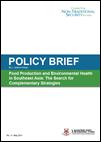 RSIS Centre for Non-Traditional Security (NTS) Studies
RSIS Centre for Non-Traditional Security (NTS) Studies
J. Jackson Ewing, NTS Policy Brief, No. 11, May 2011.
Growing food demands and escalating environmental stresses create a series of challenges throughout Southeast Asia. Projected population and consumption patterns strongly suggest that food production will have to increase markedly in the coming decades to avoid a reduction in the quality of life and pronounced food insecurities in various parts of the region. Efforts to increase food production may in turn place greater stress on vital environmental systems and cause a range of negative and lasting corollary effects. Such a scenario is far from inevitable, however, and many tools are already in existence that can help the region concurrently achieve greater food producing capacities and the environmental conditions necessary to sustain future social progress. This policy brief offers analyses that address how such a future can be attained, and presents recommendations for those in search of complementary environmental and food production strategies. |
|
The Challenges and Opportunities of Farmland Acquisition in Southeast Asia
 RSIS Centre for Non-Traditional Security (NTS) Studies
RSIS Centre for Non-Traditional Security (NTS) Studies
Irene A. Kuntjoro and Pau Khan Khup Hangzo, NTS Perspectives, Issue 7, July 2011.
One of the lingering effects of the food price crisis of 2007–2008 is a surge in the acquisition of farmland in developing countries by wealthier, food-insecure nations and private investors, with the aim of producing crops for their own markets. These projects could lead to much-needed investment being injected into rural, agricultural areas. However, there are also potential negative consequences, such as the poor losing access to, and control over, land on which they depend. It is therefore crucial that these land deals and the environment within which they take place are structured in such a way that they minimise the threats to human security and optimise the benefits. |
|
New Institutional Developments in ASEAN: Towards A More Effective (Genuine) Security Architecture?
 RSIS Centre for Non-Traditional Security (NTS) Studies
RSIS Centre for Non-Traditional Security (NTS) Studies
Holly Haywood, NTS Alert, Issue 2, September 2011.
The recent establishment of the ASEAN Defence Ministers’ Meeting-Plus (ADMM-Plus) as an integral part of the ADMM, a forum created in 2006 as a means of fostering defence and security dialogue and cooperation within the region, has elevated the buzz surrounding ASEAN’s efforts to consolidate regional political and security cooperation, with many positing that the new forums are a significant step towards the formation of an ASEAN security community. This NTS Alert considers the kind of security governance that ASEAN’s new and existing institutions – specifically the ADMM and the ASEAN Regional Forum (ARF) – appear geared towards; and whether there are indications that ASEAN is attempting to evolve its framework for regional (security) governance – constituted by an array of overlapping institutions – into a more coherent security architecture. |
|
Examining ASEAN Capacity in the Context of the Thai-Cambodian Border Dispute
 RSIS Centre for Non-Traditional Security (NTS) Studies
RSIS Centre for Non-Traditional Security (NTS) Studies
Holly Haywood, NTS Alert, Issue 1, September 2011.
Amidst heightened expectations regarding ASEAN’s contribution to international order, particularly in the context of a trend towards multilevel security governance, ASEAN is attempting to transform itself into a more proactive and effective organisation. Under Indonesia’s chairmanship, it has approached the border dispute between Thailand and Cambodia as a significant opportunity to develop its capacity for conflict management and resolution. However, the ensuing diplomatic saga in the Thai, Cambodian and Indonesian capitals has served to remind us of the many obstacles that ASEAN invariably faces in this endeavour, not least of which are powerful domestic interests and actors with divergent motivations. |
|
Responding to Protection Gaps in Malaysia’s Anti-Human Trafficking Policies
 RSIS Centre for Non-Traditional Security (NTS) Studies
RSIS Centre for Non-Traditional Security (NTS) Studies
Manpavan Kaur, NTS Alert, Issue 2, August 2011.
This NTS Alert discusses the protection gaps in national anti-human trafficking policies perpetuated by the dominant influence of the US Trafficking in Persons (TIP) Reports. Using Malaysia as a case study, this NTS Alert discusses how over-reliance on the US TIP Reports has led certain states to focus their national policies on prosecuting traffickers. Without a more balanced approach, trafficked persons remain inadequately protected. The experiences of local communities in Malaysia can be tapped upon to inform more holistic anti-human trafficking policies; they currently collaborate with the non-government sector to assist with these protection needs. However, the non-government sector experiences restrictions in influencing policy changes. Thus, it is suggested that a rebalancing of the US Department of State’s skewed focus on prosecuting traffickers is needed to promote internal policy changes in Malaysia. |
|
The Implications of the US Anti-Human Trafficking Strategy for National Policies: The Case of Malaysia
 RSIS Centre for Non-Traditional Security (NTS) Studies
RSIS Centre for Non-Traditional Security (NTS) Studies
Manpavan Kaur, NTS Alert, Issue 1, August 2011.
The annual US Trafficking in Persons (TIP) Report has become the primary international enforcement mechanism against human trafficking. This NTS Alert discusses the role played by this mechanism, and critically analyses its effectiveness in combating human trafficking and influencing national policies. The case of Malaysia is used to assess the impact of this US strategy on national policies. One shortcoming of the strategy is highlighted: it prioritises prosecution rates of traffickers over the rights protection of those trafficked, thereby creating a human security deficit in responding to human trafficking. |
|
Financing Smallholder Aquaculture Enterprises
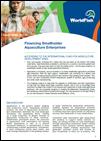 The Worldfish Center
The Worldfish Center
Policy Brief, No. 7, 2011.
This policy brief provides guidance on investing in the improvement or establishment of smallholder aquaculture enterprises. It builds upon experiences of working with smallholder commercial farmers in Asia, and particularly from facilitating improvements with small-scale shrimp and fish farmers in Aceh, Indonesia, analyses of the Vietnamese catfish industry, a review of aquaculture producer organisations as well as cross-commodity and country comparisons. It is intended to guide both public and private actors in approaches to financing improvements in business oriented smallholder aquaculture, and to be an entry point for the private sector on more inclusive ways to engage smallholders in value chains. |
|
Aquaculture and Markets: A Research Agenda
 The Worldfish Center
The Worldfish Center
A. Gordon and L. Kassam, Issues Brief, No. 34, 2011.
This issues brief proposes an agenda for markets and trade research that supports pro-poor development of aquaculture. It summarises key trends and issues relating to global aquaculture development and identifies critical markets and trade dimensions. Coinciding with renewed interest and change in global agricultural research, this brief is targeted at aquaculture development practitioners and researchers. |
|
Gender and Aquaculture: Sharing the Benefits Equitably
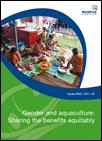 The Worldfish Center
The Worldfish Center
Nireka Weeratunge-Starkloff ands Jharendu Pant, Issues Brief, No. 32, 2011.
Aquaculture is the fastest growing agricultural sector in the world; it can meet both the food security and cash needs of poor households in Africa and the Asia-Pacific region. This brief asserts that social inclusion and ecological sustainability are crucial to ensure that aquaculture interventions have lasting impacts on livelihoods. There is thus a need for policies in the aquaculture sector to ensure that outcomes are gender equitable, pro-poor and environmentally sustainable. |
^ To the top
Commentaries and Other News Articles
Food Security Should Be about Feeding the Hungry, Not Making a Profit
Ben Shepherd, The Conversation, 21 September 2011
All the Way with the US in the Fifth Domain of Warfare
Peter Hartcher, Sydney Morning Herald, 20 September 2011
The Greening of China A Mirage
John Lee, The Australian, 19 September 2011
ASEAN Response to Asian Food Security Concerns
Yang Razali Kassim, RSIS Commentaries, No. 125, 25 August 2011
Singapore’s Growing Role in Asian Food Security
Yang Razali Kassim, RSIS Commentaries, No. 124, 25 August 2011
Singapore to Address Global Food Security through R&D
Jenny Marusiak, Eco-Business.com, 15 August 2011
Forward Thought Leadership Series: Prof. Paul Teng on Food Security
Chris Tobias, Forward Thinking Blog, 11 August 2011
Papua Lacks Modalities to Promote Good Governance
Vidhyandika Djati Perkasa, The Jakarta Post, 5 August 2011
Feeding Asia in the 21st Century: Building Urban-Rural Alliances at International Conference on Asian Food Security (ICAFS) 2011 in Singapore
Asia-Pacific Biotech News, August 2011
Experts Discuss Asian Food Security
Farming First, New Agriculturist, August 2011
Worries on the Economic Front
Yogendra Yadav, The Hindu, 10 August 2011
Corruption Is the Big Issue
Yogendra Yadav, The Hindu, 9 August 2011
Starvation Stakes
Katherine Fleming, Weekend West, 23 July 2011
Asia Pacific Summits: How China, US and ASEAN Can Collaborate
Zha Daojiong, RSIS Commentaries, No. 108, 21 July 2011
ICAFS 2011 to Address Issues of Food Security in Asia
Bernama, 13 July 2011
Asian Democracy Crusades Take Root
Gerhard Hoffstaedter, The Australian, 5 July 2011
No Easy Solutions for Asylum-Seekers
Gerhard Hoffstaedter, The Australian, 17 May 2011
^ To the top |